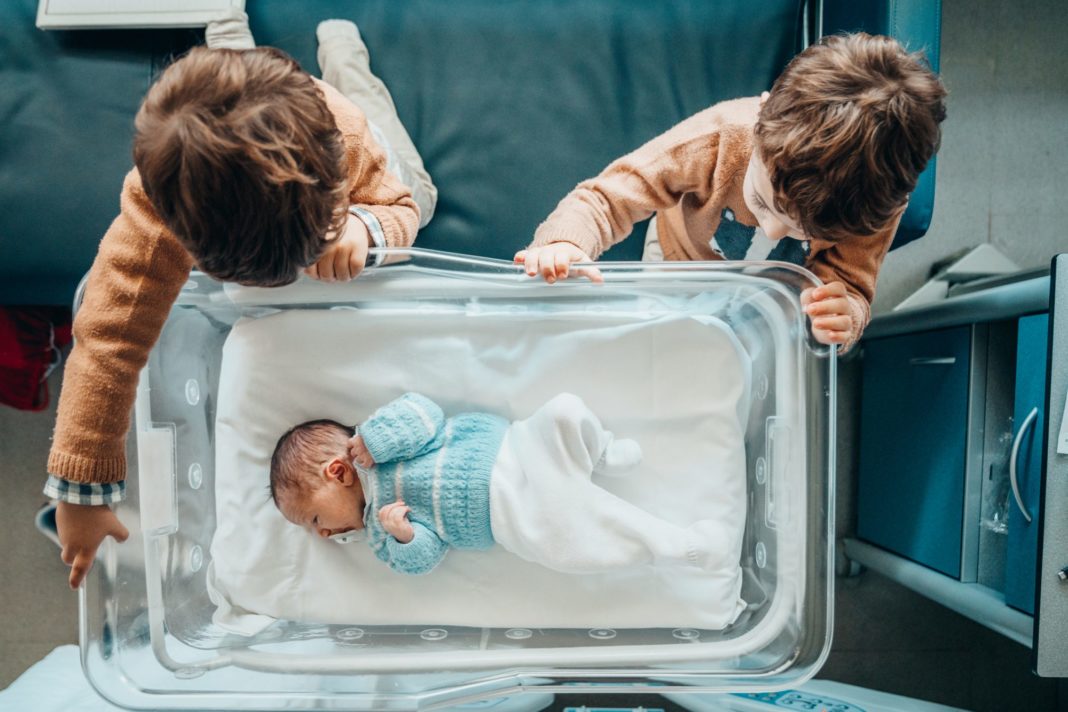
At the beginning of the pandemic, there was speculation that there might be a baby boom. As people were urged to stay home, the joke was bored couples would, well, opt to conceive.
While some hospitals across the country are noticing a boom, including an Indianapolis one which says deliveries are up 30 percent, experts predict that won't be the overall reality of 2021.
Instead, the pandemic will more likely lead to a baby bust.
Birth and fertility rates in the U.S. dropped in 2020, according to data published in May 2021 by the Centers for Disease Control and Prevention (CDC). The U.S. birth rate decreased by 4 percent from 2019, marking a decline for the sixth year in a row, and making it the lowest number of births since 1979. The fertility rate was also down 4 percent.
And there's more: A report about Google Trends found a decrease in pregnancy-related terms since the pandemic. Surveys show a change in family planning, including one that found more than 40 percent have shifted their plans on when to have kids and how many to have. States, including Florida, Ohio, and Arizona, have also reported drops in birth rates.
Interestingly, fertility clinics in the U.S. have seen a spike in new patients wanting to freeze their eggs and seeking other fertility treatments, according to a March 2021 Today article. One of those includes Shady Grove Fertility, which has several locations across the country, and reported a 50 percent increase in egg freezing cycles between June and November 2020.
While that can indicate more babies down the line, a report from Brookings Institution published in December 2020 estimates the pandemic could cause about 300,000 fewer baby births in 2021.
"We started seeing reports about the likelihood of an increase in birth rates," says Phillip Levine, Ph.D., a professor of economics at Wellesley College and co-author of the Brookings Institution report. "The logic for those stories usually had to do something with blizzards or electric blackouts and myths about how births increased after those sorts of events."
But when looking at evidence of how economic conditions affect family planning, it's probably not the case that more babies than usual will be born. Take a look back at the Great Recession which led to nearly 2.3 million fewer babies born in the U.S. between 2008 and 2013. "When times are tough, people have fewer babies," says Dr. Levine. We are currently seeing a 6.7 percent unemployment rate, up from about 4 percent around the same time in 2019, and it's unclear when the economy will recover from the pandemic.
Of course, we are also living through a public health crisis where having a baby can be scary—whether you are financially stable or not. Research shows that fertility rates declined during the Severe Acute Respiratory Syndrome (SARS) epidemic in 2003, the Zika virus outbreak 2015 to 2016, and during the 1918 influenza pandemic.
Jolene Muscat, M.D., an OB-GYN specializing in maternal fetal medicine at South Shore University Hospital, part of Northwell Health, has heard concerns from her own patients about getting pregnant during this time. "Patients have always considered various medical, financial, and social factors when deciding if and when to get pregnant, and all of this has been heightened by the pandemic," she says. "Patients have expressed concern regarding their own health and the potential risks to pregnancy if exposed to COVID."
Patients who are already parents, says Dr. Muscat, worry about having to go through pregnancy with additional stressors, such as virtual learning with their older kids. "They also worry about the limited social support and interaction they may have after a baby is born because of the continued recommendation for social distancing," she adds. "What most patients express is fear of the unknown."
So, what does fewer births means? "Fewer people is a smaller economy and that will filter through society as those children age," says Dr. Levine. "The fact that there's fewer workers hurts gross domestic product (GDP), it hurts the ability to fund the social security system, which is based on taxes paid by current workers." And while a few hundred thousand fewer births isn't a huge deal, this comes at the heels of an already big decline in births—the U.S. birth rate fell to the lowest in 35 years in 2019.
Yet those currently pregnant or hoping to become pregnant soon, shouldn't feel overly discouraged. While COVID is a real concern and getting pregnant during such a time can be frightening, physicians have been working hard to develop safeguards in order to see and treat patients. "Our medical societies, including ACOG (American College of Obstetricians and Gynecologists) and SMFM (Society for Maternal-Fetal Medicine), are working diligently to make recommendations for clinical care based on the most up-to-date scientific evidence available," says Dr. Muscat. "Patients can be reassured their physicians are knowledgeable regarding best clinical practices."
Her advice: Always make sure to speak to your physician in order to develop a plan before pregnancy that will work for you during the pandemic and beyond.

































